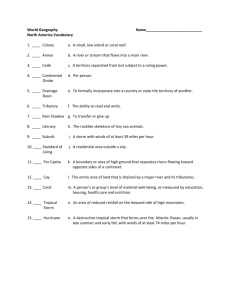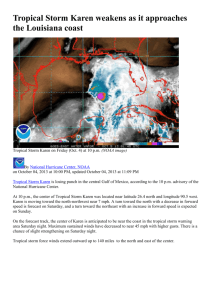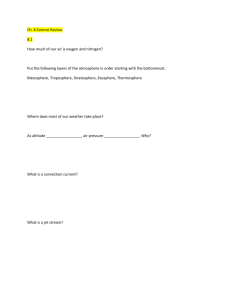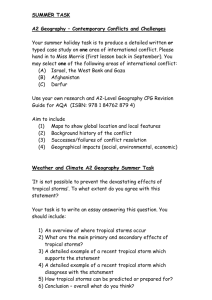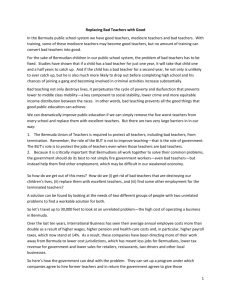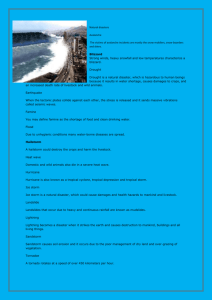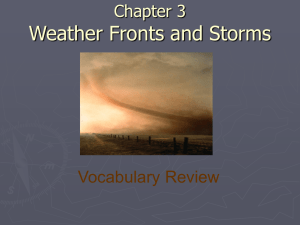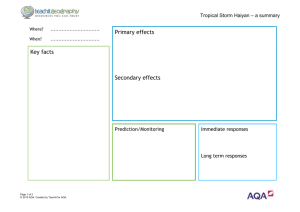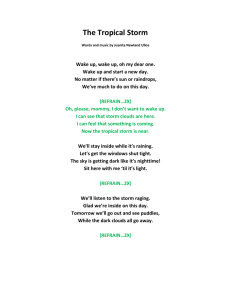English
advertisement
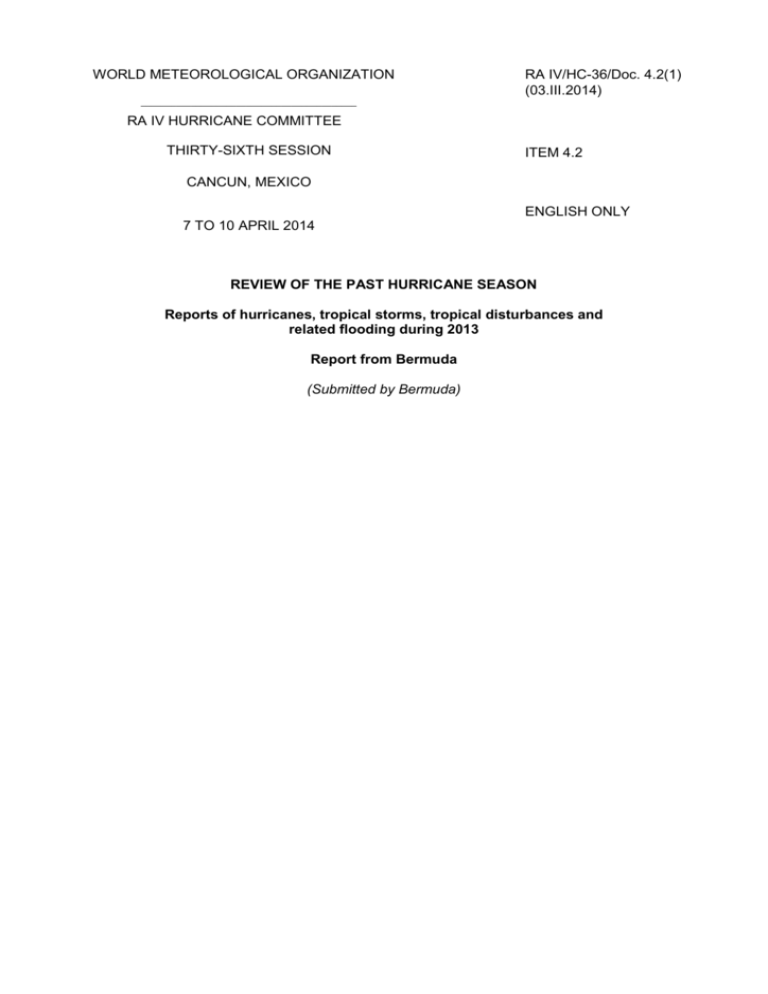
WORLD METEOROLOGICAL ORGANIZATION RA IV/HC-36/Doc. 4.2(1) (03.III.2014) ___________________________________________ RA IV HURRICANE COMMITTEE THIRTY-SIXTH SESSION ITEM 4.2 CANCUN, MEXICO ENGLISH ONLY 7 TO 10 APRIL 2014 REVIEW OF THE PAST HURRICANE SEASON Reports of hurricanes, tropical storms, tropical disturbances and related flooding during 2013 Report from Bermuda (Submitted by Bermuda) RA IV/HC-36/Doc. 4.2 (1), p.2 Table of Contents Review of 2013 Season ................................................................................................................... 2 Tropical Storm Gabrielle, September 10th – 12th.............................................................................. 2 Summary Table - 2013 Tropical systems that affected Bermuda .................................................... 8 REVIEW OF 2013 SEASON Bermuda experienced a significantly less active tropical cyclone season than during 2012, as was typical across the whole Atlantic basin. Only one tropical cyclone, Tropical Storm Gabrielle, had any significant impact, although it is worth noting that this storm was essentially a direct hit and warranted a Tropical Storm Warning. Distant Hurricane Humberto provided long period swells, bringing enhanced surf conditions on the South Shore, whilst although Tropical Storm Melissa provided shorter period swells, its relatively proximity to Bermuda (500 nm closer than Humberto) generated more significant easterly swells, warranting a Small Craft Warning (for seas 9 ft or more). TROPICAL STORM GABRIELLE, SEPTEMBER 10TH – 12TH TD7 was identified by aircraft reconnaissance just south of Puerto Rico, at 1800 hrs (local Bermuda time) on Wednesday 4th September 2013, and it intensified to Tropical Storm Gabrielle as it approached western Puerto Rico and eastern Hispaniola. TS Gabrielle then dissipated into a remnant low (0000 hrs Friday 6th September) as it moved over the eastern fringes of the Dominican Republic. RA IV/HC-36/Doc. 4.2 (1), p.3 On Friday 6th September, Bermuda Weather Service (BWS) advised the local Emergency Measures Organisation (EMO) to keep a watch on the remnant low of Gabrielle as redevelopment was possible on Bermuda’s doorstep early the following week. This was an important step as communication and media/news outlets are typically at a minimum over the weekend. A well sheared environment prevented any further development of the remnant low as it moved north-northeast over the weekend and into Monday 9th September. However, later that night deep convection developed and persisted, especially around the eastern side of the circulation. An Ascat overpass confirmed winds up to tropical storm force and as such, advisories were reinstated at 0600 hrs (local Bermuda time) on Tuesday 10th September for the redevelopment of TS Gabrielle. The short term forecast for TS Gabrielle put the storm on a heading north towards the western fringes of Bermuda’s marine area, with a closest point of approach within 25 nautical miles of the Island (inside our marine area) at around midnight on the Tuesday. After consultation with NHC at 0300 hrs, BWS agreed to issue a TS Warning in concert with the 0600 hrs NHC advisory. In accordance with this agreement, Bermuda Weather Service issued a Tropical Storm Warning as of the regular early morning forecast update at 0530 hrs. The official BWS forecast, adjusted slightly during the course of the 10th September (with further updates from NHC and the associated Hurrevac data), called for increasing winds (45-55 knots for a time overnight with gusts to 70-75 knots, especially in exposure and across elevated parts of the Island) with developing showers and rain, as well as the risk of embedded thunder. Seas were forecast to rise to as high as 18 feet outside the reef. Although not specifically mentioned in the official BWS forecast products, a storm surge of up to 2-3 feet was estimated by NHC, with rainfall amounts of 3-5 inches, locally 7 inches. Rainfall amounts were tapered back a bit during further conference calls with NHC, partly because a lot of the deep convection was being sheared to the east of Bermuda. As forecast, winds gradually increased to tropical storm force by early evening, and isolated showers in the day increased to more persistent rain later in the evening. TS Gabrielle made passage to our near west (approx. 22 nm to the west of the city of Hamilton) around 0100 hrs on Wednesday 11th and this was also well forecast. As it began to slowly move away northwest, conditions gradually improved during the morning of the 11th, and the Tropical Storm Warning was dropped at 0900 hrs, with a Small Craft Warning taking its place for strong winds (20 knots or more) and locally rough seas outside the reef (9 feet or more). Rainfall for the main duration of the event, from the early morning of the 10th through the early afternoon of the 12th (06z on 10th to 18z on 12th), amounted to 1.43 inches at Bermuda Weather Service, although greater amounts are likely to have fallen across other parts of the Island according to informal reports and radar imagery. As intimated earlier, the NHC rainfall estimates, as per the Hydrometeorological Prediction Center, were initially overforecast, and part of the reasoning for this appeared to be the fact that more of the deep convection associated with TS Gabrielle was sheared to the east (offshore of Bermuda) than forecast by the computer models. RA IV/HC-36/Doc. 4.2 (1), p.4 Main impacts of Tropical Storm Gabrielle on Bermuda were the strong winds which downed tree branches, palm fronds and other foliage, some minor infrastructure damage (report of a dock and boat damaged in Dockyard), and a minimal storm surge (estimated to have been around 1 foot by a BWS forecaster on the south side of St George’s – note that the NOAA Esso Pier buoy located on the north side of St George’s actually recorded slightly below average tides during the event, possibly due to lee effects). Minor power outages were recorded across the Island. August was a very wet month with over 10 inches or rain (approximately twice the average), and as such much of the flora was overgrown, likely contributing to enhanced foliage damage. A few flights at L. F. Wade International Airport and some commuter/tourist ferries were cancelled. In addition, the Norwegian Dawn, a regular cruise ship visitor in port at Dockyard, was tied up with extra precaution. The Government decision to close all public schools for the 11th was overturned in the early morning of that day after assessment of the road network and power to schools. As it transpired, only a few remained closed due to power outages. As has been the case with other recent tropical storms, one of the biggest challenges for BWS has been pressure to communicate exact details of strength and duration with confidence, especially of the 50 knot sustained wind threshold, which significant operational decisions are based on. However, due to the size of Bermuda, any slight changes in tropical storm track and intensity can have significant impacts for the Island, and consequently a widely varying forecast. BWS always strive to convey the level of uncertainty of a particular tropical cyclone with the forecast, but this is sometimes of limited use to higher level decision makers who have to make a judgement call. BWS continue to enhance their communication with higher level decision makers, in order to mitigate the issues above as much as possible. In addition, as of the 2013 Hurricane Season, a text message notification system to the public via the two main cell phone providers, Digicel and Cellone, was established. Shortly after the initiation of the Tropical Storm Warning, this new communication method was executed, with all Digicel/Cellone subscribers being sent a message similar to that below on their cell phones: EMO Alert: Tropical Storm Warning has been issued at 6am for Bermuda for TS Gabrielle. Monitor www.weather.bm for the detailed forecast.-EMO There was some delay in receipt by some subscribers. This was due to local network limitations of disseminating a timely message to tens of thousands of subscribers. A video of the Post TS Gabrielle briefing by the Minister of Public Safety, the Hon. Michael Dunkley, is available at: http://www.youtube.com/watch?v=IEl26716QNA Table of maximum winds (sustained and gusts) at various locations across Bermuda (ranging from near sea level Airport/Causeway to approx. 290 ft at Harbour Radio), generally around evening time: RA IV/HC-36/Doc. 4.2 (1), p.5 Location Maximum sustained wind Maximum gust LF Wade International Airport 39 knots 49 knots Commissioner’s Point, Dockyard 47.5 knots 58.9 knots Causeway sensor 38 knots 55.3 knots Harbour Radio 50 knots 65 knots Verification – referencing the table above, the forecast for a period of sustained winds of 45 knots with gusts to 55 knots during the evening was well verified. Gusts were only a little below forecast with Harbour Radio recording 65 knots, compared with the forecast of 70-75 knots. However, overnight the winds did tend to die down quicker than forecast. Nevertheless, the Tropical Storm Warning verified and was wholly appropriate for the conditions experienced across Bermuda and the local waters. Ascat satellite overpass (2200 hrs local time on the 10th) clearly showing the circulation of TS Gabrielle just south of Bermuda: RA IV/HC-36/Doc. 4.2 (1), p.6 In addition, satellite and radar images are provided below: Satellite image for 2015 UTC on 10th September: RA IV/HC-36/Doc. 4.2 (1), p.7 Radar image for same evening at approximately 2200 hrs local Bermuda time: NOAA tide data for Esso Pier: RA IV/HC-36/Doc. 4.2 (1), p.8 SUMMARY TABLE - 2013 TROPICAL SYSTEMS THAT AFFECTED BERMUDA Summary Table Storm Name TS Gabrielle TS/HURCN Humberto (distant east) STS/TS Melissa (distant east) Month Watch/Warning Issued for Bermuda Maximum Wind Speed at LF Wade September 10-12th Tropical Storm Warning issued 0530 hrs 10th, ended 0900 hrs 11th September 16-17th *N/A 39 knots gust 49 knots around 1930 hrs on 10th November 18-20th N/A Small craft warning issued at 1130 hrs 18th due to easterly swells *N/A *Although Humberto did not produce wind/seas significant enough to warrant any warnings, it did produce enhanced long-wave swells along the South Shore
